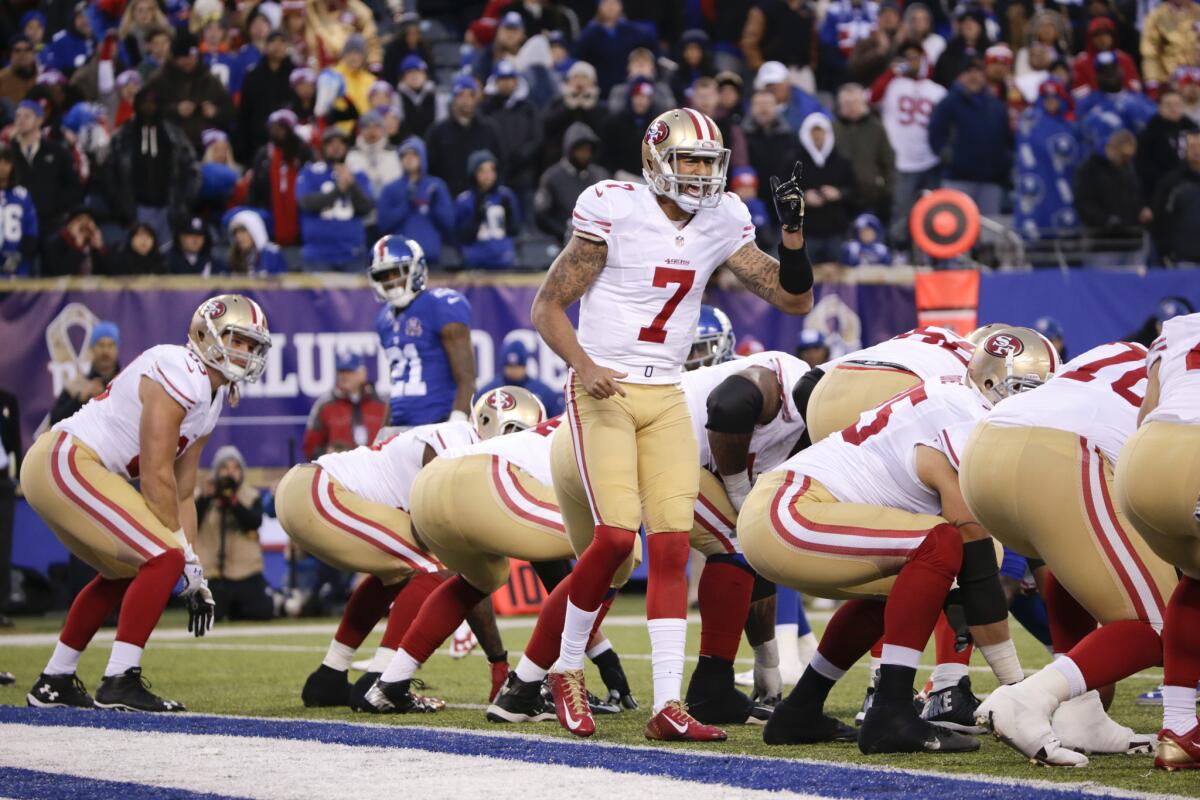DEA agents conduct checks on NFL teams’ medical staffs

- Share via
Federal drug agents surprised at least two NFL teams, including the San Francisco 49ers, on Sunday by showing up to check on their doctors while a growing class-action lawsuit by former players alleges that the league illegally handed out painkillers and other prescription pills.
The Drug Enforcement Administration checked the 49ers’ medical staff at MetLife Stadium in East Rutherford, N.J., after the team played the New York Giants, the team confirmed. The Tampa Bay Buccaneers said their staff was checked at Baltimore-Washington International airport after a game against the Redskins. News outlets have also reported that agents visited the Seattle Seahawks as well.
“DEA agents are currently interviewing NFL team doctors in several locations as part of an ongoing investigation into potential violations” of the Controlled Substances Act, agency spokesman Rusty Payne said Sunday. He did not respond to The Times’ inquiries about whether any irregularities were found or arrests made.
If the inspections uncovered any problems, NFL spokesman Brian McCarthy said, the league doesn’t know about it. “Our teams cooperated with the DEA today, and we have no information to indicate that irregularities were found,” he told The Times on Sunday afternoon.
In the spot checks, DEA investigators requested documentation from visiting teams’ medical staffs for any controlled substances in their possession, and for proof that doctors could practice medicine in the home team’s state.
In a statement, the 49ers called the inspection random. The Buccaneers said on Twitter that the DEA’s check delayed the team only five minutes, after which the team proceeded onto its plane “without incident.”
The nationwide probe is being directed by the U.S. attorney’s office for the Southern District of New York — where the NFL is headquartered — and involves several U.S. attorney’s offices.
The investigation was sparked by a lawsuit filed in May on behalf of former NFL players going back to 1968. The number of plaintiffs has grown to more than 1,200, including dozens who played as recently as 2012. Any violations of federal drug laws from 2009 on could also become the subject of a criminal investigation.
The suit, filed in U.S. District Court in San Francisco, claims the NFL “has intentionally, recklessly and negligently created and maintained a culture of drug misuse, substituting players’ health for profit.”
Federal prosecutors have conducted interviews in at least three cities over the last three weeks, spending two days in Los Angeles in late October meeting with half a dozen former players — including at least two who were named plaintiffs in the painkillers lawsuit, according to people with direct knowledge of the meetings who spoke on the condition of anonymity because prosecutors told them not to comment on the meetings.
The lawsuit alleges that the NFL and its teams, physicians and trainers withheld from players information about their injuries while at the same time handing out prescription painkillers such as Vicodin and Percocet, and anti-inflammatories such as Toradol, to mask pain and minimize lost playing time. The players contend that some teams filled out prescriptions in players’ names without their knowledge or consent, then dispensed those drugs — according to one plaintiffs’ lawyer — “like candy at Halloween” as well as combining them in “cocktails.”
Several former players interviewed by The Associated Press described the line of teammates waiting to get injections on game day often spilling out from the training room. Others recounted flights home from games where trainers walked down the aisle and players held up a number of fingers to indicate how many pills they wanted.
Mel Owens, among the attorneys representing the players and a former standout linebacker for the Los Angeles Rams, said in May that the “culture of the NFL” is to blame for any abuse of painkillers and not the players themselves.
Owens said the roster of former players in the lawsuit has grown to more than 1,000.
“If the DEA is looking at you, they’ve got a reason to,” said Owens, a former standout linebacker for the Los Angeles Rams. “They’re looking for people who break the law, not people who are following the law.”
The former players have reported a range of debilitating side effects, including chronic muscle and bone ailments, addiction and permanent nerve and organ damage. They contend those health problems came from drug use, but many of the conditions haven’t been definitively linked to painkillers.
Presiding judge William Alsup said he wants to hear the NFL Players Assn.’s position on the case before deciding on the league’s motion to dismiss. The NFL maintained in court that it’s not responsible for the medical decisions of its 32 teams. League attorneys also argued the issue should be addressed by the players union, which negotiated a collective bargaining agreement that covers player health.
The DEA investigation comes during a turbulent time for the NFL.
The league is still weathering criticism over its treatment of several players accused of domestic violence, and it just wrapped up an arbitration hearing involving Ravens running back Ray Rice, who is seeking reinstatement after being indefinitely suspended by the NFL in September. The league has hired former FBI director Robert Mueller III to investigate its handling of the Rice case.
The NFL is also trying to finalize a $765-million class-action settlement reached in August 2013 over complaints by thousands of former players that the NFL concealed the risk of concussions.
The Associated Press was used in compiling this report. Times staff writers Sam Farmer and Kurtis Lee contributed to this report.
More to Read
Go beyond the scoreboard
Get the latest on L.A.'s teams in the daily Sports Report newsletter.
You may occasionally receive promotional content from the Los Angeles Times.












